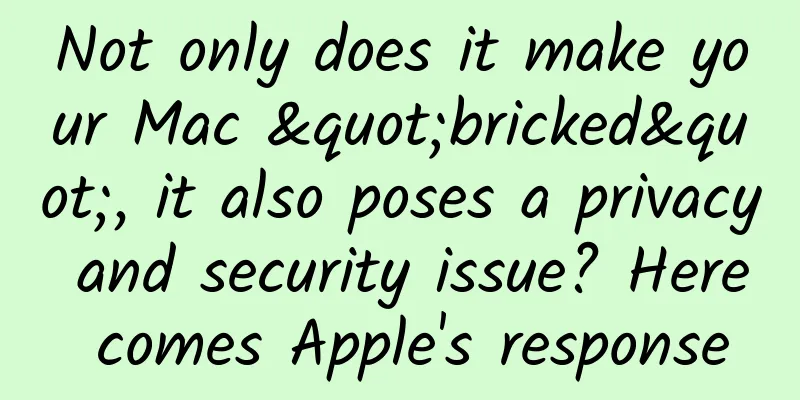Not only does it make your Mac "bricked", it also poses a privacy and security issue? Here comes Apple's response

|
This article is reproduced from Leiphone.com. If you need to reprint it, please go to Leiphone.com official website to apply for authorization. The new version of Mac system, macOS Big Sur, has recently been officially launched to all Mac users. The oldest supported models date back to the MacBook Pro and MacBook Air series launched in 2013.
A large number of late 2013 and mid-2014 13-inch MacBook Pro users have reported that macOS Big Sur fails to boot after the update. In a post on the MacRumors forum, a large number of users reported this issue. Similar issues have also been reported on Reddit and the Apple Support Community, indicating that this problem is widespread. Recently, a security researcher Jeffrey Paul wrote a blog post about the issue. He said: macOS Big Sur has a potential big privacy issue, which is the reason why Mac is slowing down. Paul believes that macOS Big Sur sends unique identifiers for every program a user runs to Apple, and that Apple's servers are constantly receiving data that causes the Mac to slow down. However, as Paul explains, the way the company sends this data is problematic because it could mean that Apple is collecting (and potentially sharing this information with third parties such as law enforcement agencies) a lot of information about what users do on their computers. Shortly thereafter, Apple responded by releasing an updated support document titled "Opening Apps Safely on Mac," in which Apple explained that the technology, called Gatekeeper, is primarily used to ensure that the software running on your computer does not contain malware, and claimed that the technology does not violate user privacy. “Gatekeeper performs online checks to verify whether an app contains known malware and whether a developer’s signing certificate has been revoked. We never combine data from these checks with information about Apple users or their devices. We do not use data from these checks to learn what individual users do on their devices. Notary checks apps for known malware using an encrypted connection that is resistant to server failures.” But Paul raised another issue in his blog post: the inability for users to opt out of Gatekeeper and the logging of IP addresses. In response, Apple said in a document that it "has stopped logging IP addresses associated with developer ID certificate checks, and we will ensure that all collected IP addresses are removed from the logs." Apple also said that for Gatekeeper, Apple will make some changes to how it "works" in 2021. The changes include new encryption protocols for developer ID certificate revocation checks, stronger protections against server failures, and the option for users to opt out of these security protections. It’s a good thing that Apple responded quickly to these issues, but it’s worrying that the company first logged the IP addresses associated with these checks and never fully communicated the meaning of Gatekeeper technology to users before. |
>>: What kind of mobile phones do the bosses prefer? Apple or Huawei? None of them
Recommend
"Rabbits are so cute, how can we eat them!!" Australians want to cry after hearing this...
"Little white rabbit, so white, with two ear...
0 sugar, 0 calories, 0 fat, can sugar substitutes really relieve your sweet burden?
Audit expert: Wu Xi Deputy Chief Physician, Depar...
Is the solar system dark? Scientists have just discovered three "planet killers," one of which poses the greatest threat to Earth
Astronomers have discovered three near-Earth aste...
Moore's Chaos Theory Chaos Theory Phase 3 Basic Course Video Baidu Cloud Download
Moore's Chaos Theory Chaos Theory Phase 3 Bas...
Boss, let’s talk about the most effective channel for attracting new customers!
Background knowledge: CAC = cost to acquire a sin...
Among the six high-tech technologies that have changed the mobile phone industry, which one do you think is the most powerful?
Nowadays, the development of mobile phones is get...
Japanese automakers face shortage of technology talent and salary levels
According to foreign media reports, headhunting f...
Google's return to China: Who is optimistic, who is pessimistic, who is panicking, and who is looking forward to it?
In February 2016, Google will officially return t...
3 steps to improve the conversion of information flow, learn them!
Why is my ad not getting any exposure no matter h...
Microsoft foldable Bluetooth keyboard review: 5mm ultra-thin and feels good
Microsoft is very experienced in manufacturing PC...
How to report fraudulent mini-programs? How to file a complaint on WeChat Mini Program?
Nowadays, people buy products through many channe...
A huge flare! What are the effects? →
According to the National Space Weather Monitorin...
3 reasons and solutions for the current low app opening rate
The open rate is a KPI indicator that all operati...
The room for price increase of China's home appliances from the crazy rise of Moutai
In recent times, the skyrocketing prices of a num...
Dating requires IQ, staying up late will make people stupid
One minute with the doctor, the postures are cons...









